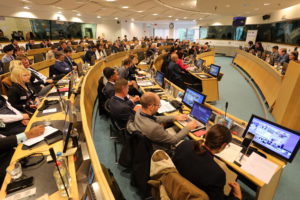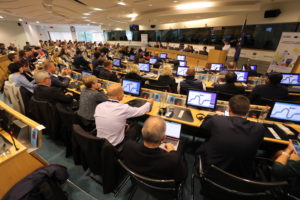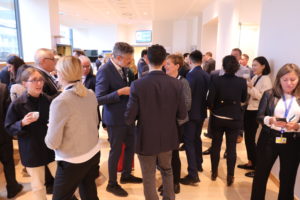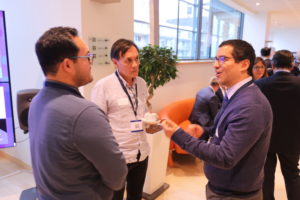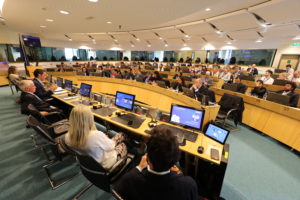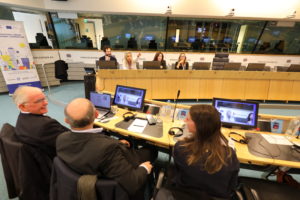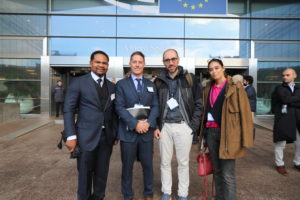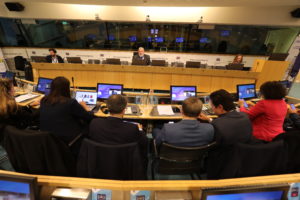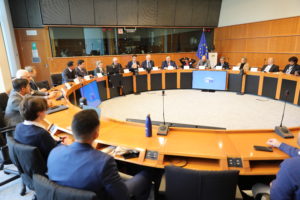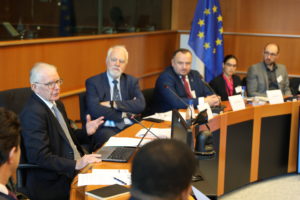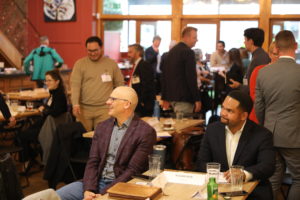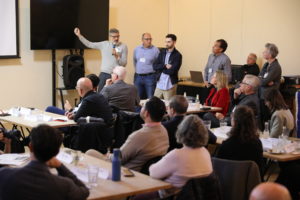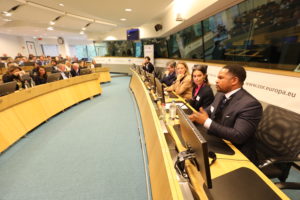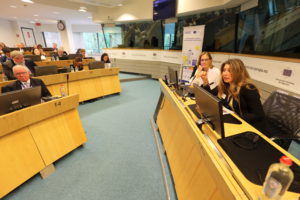“World peace,” “progress,” “unity” and “working together.” These may seem like lofty notions, even naïve ambitions these days. However, at the final event of the European Commission’s International Urban and Regional Cooperation (IURC) programme, these audience sentiments about the meaning of the three-years of international exchange seemed of a piece with the more pragmatic “learning,” “collaboration,” and “partnerships” that the 178 cities and regions engaged in the programme cited as synonymous with IURC.
Over three years, European cities and regions have had the opportunity to cooperate with colleagues across the world in order to develop their capacity in ecological transition and the Green Deal; urban & regional renewal and social cohesion; and innovative sustainable & carbon neutral ecosystems and strategic sectors.
From running more effective and empowering foodbanks for the socially vulnerable, to creating major opportunities for businesses in international markets, IURC has fostered lasting cooperation between EU cities and their counterparts in Asia and Australasia, China, Latin America and North America.
You can see the event’s slides here.
Decentralised foreign policy
“Our focus is on ground-up initiatives that uncover and promote fresh ideas. Ultimately, it’s about delivering services to the citizens,” said Peter M. Wagner, Director and Head of Service for the Service for Foreign Policy Instruments (FPI) at the European Commission, which co-manages IURC with the European Commission’s Directorate General for Regional and Urban Policy.
Opening the final event of IURC, Wagner declared that “The entire world is witnessing a surge in urbanisation, and with it comes an array of challenges, especially in the areas of sustainability and inclusiveness.” In an urban environment, the gravity of these challenges can’t be overstated. For Wagner, the key to sustainable development lies in managing this rapid urban growth sustainably. To achieve this, the FPI has always supported a grassroots approach to problem-solving, according to Wagner, who acknowledges the multifaceted challenges that cities are up against. “These challenges call for innovative solutions. We’re proud to be part of these efforts.”
“With the IURC, we’ve happily been able to operate in a decentralised manner,” Wagner remarked. Celebrating the IURC’s achievements, he said, “There’s ample reason to rejoice over the temporary culmination of the efforts our cities and regions have put in. For the FPI, it’s rejuvenating. It allows us to witness our foreign policy in action at the grassroots level, revealing a side of it that goes beyond traditional diplomacy.”
You are currently viewing a placeholder content from YouTube. To access the actual content, click the button below. Please note that doing so will share data with third-party providers.
Describing the IURC as a “marketplace of ideas,” Wagner emphasized its role as a platform for mutual learning. “The IURC has enabled numerous cities to devise actions, joint action plans, and collaborative projects. Our aspiration is that these evolve into enduring partnerships.”
Citing specific examples, Wagner mentioned the collaboration between ANCI (Anci-Lazio Region) and Barranquilla. What began as a partnership focused on migration evolved into broader projects, such as urban gardens. “This partnership expanded the scope of urban gardening by integrating it with urban planning. The approach is now gaining traction, with more cities joining the fold,” he noted.
In total, the IURC witnessed the pairing of 138 cities from 40 countries, including 19 EU member states and 19 other nations from across the globe. Wagner highlighted the synergy between Essen and Fortaleza, which centred on the circular economy and waste management, aiming for zero-waste processes, as well as the partnership between Bangkok Metropolitan Association and Milan on the food waste. “This initiative, involving numerous stakeholders at the grassroots, holds immense potential for global replication,” Wagner said.
He also highlighted the participation of 40 sub-national regions from 11 EU member states, five Latin American Caribbean countries, and China. “These regions, despite being separated by vast distances, managed to exchange ideas and learn from one another. This embodies the essence of the IURC,” Wagner stated.
In Wagner’s eyes, the IURC has always been on the right track. “With targeted project-related work, we can build bridges that not only facilitate idea exchanges but also foster unity. In our tumultuous world, this is becoming more and more crucial,” he added.
Concluding his remarks, Wagner expressed his optimism for the future, “We’ve showcased the IURC’s success by launching similar initiatives in North America and the Pacific under the Global Europe Facility. Our journey of collaboration and mutual learning continues.”
Joint solutions to common challenges
There is a Chinese proverb that states “Reading ten thousand books is not as useful as traveling ten thousand miles.” Despite the diversity of contexts in cities and regions around the world, it is clear that far-flung locations often have harbour dramatic insights for each other.
“EU and non-EU regions can develop joint solutions to common challenges,” said Ana Contreras Escribano, the IURC’s Consortium Project Manager from ACCIONA, introducing a selection of cities and regions that had cooperated with very successful outcomes in the ecological and energy transition through IURC.
Fortaleza & Essen: Building a sustainable waste management blueprint
Deputy Mayor of Fortaleza, Élcio Batista, candidly assessed their current situation, saying, “Though we are one of the leading cities in Brazil when it comes to recycling, our current rate of 5% leaves much room for improvement.”
The many achievements of the collaboration included solid waste collection guidelines, a pilot project to bolster recycling rates, a robust legal framework, including a municipal circular economy policy and a comprehensive Recycling Engagement Plan. Key to developing all of these was improving collaboration in Fortaleza, both among municipal departments and between the city and its residents, with Batista proudly recounting that “This holistic approach has produced tangible outcomes that align perfectly with Mayor Sarto’s ambitious vision: achieving a 50% recycling rate in the next eight years and positioning Fortaleza as a reference point of sustainable waste management in Latin America.”
Beyond these achievements, Batista felt the human element of the collaboration was its true triumph: “Beyond all the legacy for the city, one of the most significant outcomes was the people we met and the invaluable lessons we acquired for our public policies.”
Piraeus & Puerto Montt: Pioneering nature-based solutions
For Vice Mayor Andriana Zarakeli of Piraeus, too, working with local people was key to her city and Puerto Montt’s shared ambition: implementing nature-based solutions for urban challenges. “We had to make sure that all partners were involved and their voices were heard,” Zarakeli said, explaining that “Addressing the challenges of urban development requires the involvement of all stakeholders, especially urban residents. It is a collective effort that relies on the participation of locals.”
In the Chilean context, this included working with indigenous communities to gain ancestral knowledge and form a vision of not just nature-based solutions, but a ‘nature-based existence.’ The cities also worked with schools to bring children into the design process.
On the bond formed through collaboration, Zarakeli added, “Yesterday I counted the kilometres, 12,159 KM of land and sea separate our cities. Thanks to IURC, we became close, and we realised how small the world can become when we create bonds with people from different geographical areas.”
Bangkok & Milan: Reinventing food strategies
In the case of Bangkok and Milan, it was each city’s culinary allure that served as the catalyst for transformative collaboration. As Pornphrom Vikitsreth, Chief Advisor to the Governor of Bangkok noted, “People come to Bangkok for many reasons, including the beaches, but food as well.”
Bangkok extended its hospitality to Milanese counterparts, showcasing projects from both the Bangkok Metropolitan Administration (BMA) and other civil society organizations. With an emphasis on practicality, Vikitsreth explained the Governor’s design-thinking approach to urban development: “Start with a small project, see that it works, and then scale it up.”
The city already uses leftover food from the renowned street food market in Bangkok’s Chinatown to stock foodbanks for those afflicted by hunger. However, inspired by Milan, the city will trial an approach that takes a space like a community centre and gives people a ticket that they can use to choose the food that meets their needs.
Bangkok has also worked with Milan to devise a strategy for food production, distribution, safety, food banks, waste management, and food education, expected for launch in November. “50% of the waste in Bangkok is organic and food waste,” explained Vikitsreth, meaning that improvement in this area could be a major triumph for local sustainability.
Lazio Region & Hangzhou: Bridging agricultural innovations and sustainability
As the capital of Henan Province, sustainable development is critical to Hangzhou, which boasts an urbanisation rate of 79.4% and a GDP of nearly 1.3 trillion yuan, ranking 16th among major Chinese cities. With a forest coverage rate of 35.2% and green coverage in built-up areas of 41.72%, Hangzhou stands out for its green and sustainable urban development.
The city’s ethos, according to Deputy Mayor Qianmiao Li, is that “clear water and green mountains are as good as mountains of gold and silver.” Hangzhou is keen to engage with European counterparts on topics from topics from clean energy to healthcare, having been selected as a pilot city for European collaboration by China’s National Development and Reform Commission.
Initiatives like the creation of over 50 green factories demonstrate local dedication to industrial transformation. Through IURC, the region paired with Italy’s Lazio region, signing of a Memorandum of Understanding in January to underscore their commitment to broadening cooperation in fields ranging from agriculture to technology and education. In Li’s words, “The vast ocean admits all rivers. We believe that with joint efforts, our cities will also achieve great successes.”
Silvia Chiave, Diplomatic Adviser and Head of International Relations in Lazio explained that her region was intrigued by the application of new technology and innovation in agriculture by their Chinese partners. When the Chinese delegation visited Lazio, their focus shifted to sustainable and bio-agriculture.
Eager to create lasting ties, Chiave brought her Chinese partners to ” startups and companies, universities, and labs where circular technology and green chemistry were being developed.” This mutual exchange expanded beyond the initial discussions, encompassing student exchange programmes, training sessions, and even collaborations in beekeeping. Chiave concluded, “The scope of the initial conversation is expanded into a wider and long-term partnership thanks to IURC and thanks to our friends in Hangzhou.”
Urban and regional renewal
“It is clear that a transition away from the ideology of the private car is also a catalyst for cities around the world to totally reimagine the urban landscape,” said Karel Van Oordt, IURC Senior Non-Key Expert, and Project Coordinator at Eurocities, commenting on the array of case studies on urban and regional renewal.
Madrid, San Diego and Melbourne: Advanced urban mobility
Under the IURC programme, says Lola Ortiz from Madrid’s General Directorate of Mobility Planning and Infrastructure, Madrid engaged in extensive knowledge exchanges with San Diego. “We got to share information about the implementation of Canalejas Mobility Hub, offering services ranging from carsharing and scooter sharing to electric charging,” Ortiz said.
Madrid also shared its urban regeneration initiatives, from the ambitious Madrid Nuevo Norte project to the pedestrian-friendly areas of Puerta del Sol & Plaza España, as well as the city’s Madrid 360 strategy for holistic urban renewal.
Madrid’s collaboration with Melbourne expanded to broader environmental concerns, addressing air quality, climate comfort, and green urban areas.
Bergamo & Aurora: Cycling into a sustainable future
Stefano Zenoni, Councillor for Mobility and Ecology in Bergamo shared the essence of his city’s work with Aurora on the cycling revolution. By viewing bike ridership akin to an ecosystem, Bergamo identified the need to develop all elements of cycling mobility cohesively. Zenoni elaborated, “The public debate is always about infrastructure, but you also need promotional policies, parking for bikes, road signs, and maps.”
For Alessandro Minnella from Aurora’s Mayor’s Office, change is about intentionality and inclusivity. He emphasized, “Change takes place in every step, through the regulatory process framework, financial planning, and intentional choices in public works facilities.” Minnella’s vision centres on public participation, bridging the gap between governmental decisions and the citizenry. By integrating the public into the decision-making process, Aurora believes in cultivating a sense of shared responsibility and ownership of urban renewal initiatives.
Bergamo embraced this approach by working with people and companies to create financial incentives for commuters to come to work by bike. The result was that Bergamo saw a ten-fold increase in its bike-sharing system users within a year. Their collaboration with Aurora, USA, offered a fresh approach to narratives and storytelling around urban mobility, focusing less on cars and more on sustainable options.
Boston & Barcelona: Reimagining urban spaces
The city of Boston has a long history of urban renewal, filled with ambitious projects and lessons learned. Kat Eshel, the Chief of Staff at Boston’s Mayor’s Office for Environment, recalled some errors in the 1960s that the city felt the need to correct: “We made some mistakes, raising neighbourhoods and moving working class people.” This era saw the construction of expansive highways that, while addressing transportation needs, inadvertently fragmented communities. The physical divisions created social and economic rifts, particularly evident in areas like Chinatown.
Eshel highlighted, “Chinatown is the hottest location in Boston, being on average 3-4 degrees Celsius hotter than the rest of the city. It’s still divided, with public housing, grocery stores, and churches standing on either side of the highway.”
Recognising the need for change, Boston undertook the ambitious ‘big dig’ project, which involved burying a significant portion of an urban highway, aiming to mend the scars left on the urban landscape. The collaboration with Barcelona, facilitated by the IURC programme, brought fresh perspectives to Boston’s urban renewal ambitions. While Boston Mayor’s Office of New Urban Mechanics (MONUM) inspired Barcelona to work on their own multi-level governance body, Barcelona introduced in return Boston to the ‘metropolitan avenues’ concept, a visionary approach to humanise highway spaces.
Drawing inspiration from Barcelona, Boston is now channelling community insights to design a park above the highway. This initiative aims not just to beautify the area but also to humanise side roads, mitigate urban heat, and address air pollution.
Of Boston and Barcelona’s collaboration, Eshel said, “The learning might be intangible, but it continues to bloom after the partnership.”
Innovation ecosystems & digital transition
Opening the session on Innovation Ecosystems & Digital Transition, Ivana Rae Almora, IURC Project Manager for EURADA, emphasised the core role of this theme in progress for any future-fit city or region.
Hangzhou & Western Greece: Agri-food and innovation
Over seven centuries since Marco Polo’s tales, Hangzhou, a region known for culture and innovation, has renewed its connection with Southern Europe through a collaboration with Western Greece. Kong Chunhao from Hangzhou Development and Reform Commission, alongside Fokion Zaimis, Deputy Governor of Entrepreneurship, Research & Innovation in the Region of Western Greece, shared insights into their joint ventures in agri-food production and SME support.
Hangzhou, once praised by Polo, continues to flourish. In 2022, its foreign trade surpassed $104.22 billion, establishing the city as a digital and economic powerhouse. With an e-commerce training centre in the works, Hangzhou is cementing its position as one of China’s 20 international comprehensive transportation hub cities, boasting extensive airline and high-speed rail networks. The city’s digital economy has seen remarkable growth, with an added value exceeding $70 billion in 2022.
Western Greece is channelling substantial funds into agri-food and innovation, key topics for Hangzhou, aiming to bridge the gap between production and research, foster digital transformation, and boost entrepreneurial competitiveness.
Both regions are deeply committed to cultural exchange and sustainable progress. Hangzhou is navigating its green transition with determination, working towards China’s ambitious ‘3060’ Dual Carbon Goal, aspiring to peak carbon dioxide emissions by 2030 and achieve carbon neutrality by 2060. Meanwhile, Western Greece is leveraging its rich cultural heritage and innovative energy sector to champion sustainability and green growth.
As Hangzhou and Western Greece continue to exchange best practices and implement innovative solutions, they are paving the way for a future filled with opportunities, sustainability, and strengthened cross-continental ties. “Our collaboration with our Chinese partner has deepened, thanks to IURC,” Zaimis gratefully concluded.
Parana & Silesia: Better business opportunities
Parana (Brazil) and Silesia (Poland) have solidified their commitment to innovation and digital transition. This partnership, encompassing digital transformation, smart specialisation, and mutual regional promotion, marked a significant step forward in international cooperation.
The regions have already initiated joint projects through the INNOGLOBO programme and are participating a the Low Carbon Business Action, showcasing their commitment to sustainable innovation. The BraSilesia initiative stands out, offering a platform for entrepreneurs from both regions to explore new markets, find business partners, and engage in collaborative research and development projects.
The collaboration between the regions also germinated an international hackathon which will bring together innovators from both areas to work in teams towards common challenges, building lasting bridges and fostering new solutions.
Participation in the International Urban and Regional Cooperation (IURC) project, said Barbara Szafir, Deputy Director Regional Development, Silesia Region, has been crucial, fostering an exchange of experiences and insights into the innovation ecosystems of both regions. This has led to the formalisation of their partnership and sets the stage for continued collaboration and mutual growth.
The collaboration between these regions is not meant to be exclusive, with Guto Silva, Secretary of Planning, State of Parana, extending an invitation to any willing partners: “We thank you, all the IURC team, welcome to Parana, let’s cocreate!”
Ottawa & Zaragoza: Post-pandemic resilience
“Our pairing with Zaragoza has expanded our knowledge on innovative methods related to sustainable tourism,” declared Jamie Hurst, from the Economic Development Department at Ottawa. The two cities have spearheaded a collaborative effort to accelerate post-pandemic economic recovery while advancing sustainability.
Both cities, explained Lorena Calvo of Zaragoza’s International Relations department, are committed to creating an environment that fosters innovation, supports new businesses, and promotes economic sustainability.
Zaragoza has drawn inspiration from the Invest Ottawa/Bayview Yards model, aiming to create a hub that consolidates talent and investment. This initiative is designed to attract new businesses, support the launch of start-ups, and nurture young talent, all under one roof. Programmes are being developed to provide comprehensive support to new businesses, ensuring a robust post-pandemic recovery.
Ottawa, on the other hand, is working to establish an Intergovernmental Relations/External Promotions Office. This office is poised to leverage European policies, such as the Green Deal and Urban Agenda, creating a significant impact at the local level. In addition to these initiatives, Ottawa is advancing sustainable tourism through the development of a sustainable tourism plan, the creation of a carbon calculator tool, and active participation in the Global Destination Sustainability (GSD) Index, where it proudly ranks 5th in North America and 65th globally.
Looking ahead, both cities have solidified their commitment to a fruitful partnership by signing a multi-year partnership agreement. This agreement ensures the continuation of best practice exchanges in critical areas such as sustainable urban mobility post-IURC.
IURC and UN Habitat
Paulius Kulikauskas, Chief of the Office for EU at UN Habitat, shed light on the significant relationship between the International Urban and Regional Cooperation (IURC) and his organisation, emphasising their joint efforts in promoting sustainable urban development.
Kulikauskas began by highlighting the longstanding involvement of UN Habitat in the IUC and its commitment to supporting sub-national governments. “We are speaking increasingly about a ‘whole of government approach,’” he said.
“When we look beyond Europe and the developed countries, we see that what has been promoted so much, decentralisation, has met with major difficulties.” These difficulties include a lack of human resources, finances, and capacity. “But,” he said, “if you ask Eurocities, European cities say that that is exactly what they are lacking,” Kulikauskas said, emphasizing the common challenges across the world.
“The UN Secretary General has instituted an advisory group on local and regional governments. In many ways, what you are doing in IURC contributes to this global process, as there are many inspiring initiatives here,” Kulikauskas said, also highlighting UN Habitat’s initiatives to bring the Sustainable Development Goals (SDGs) closer to the local level and the establishment of a new office to further these efforts.
Kulikauskas was keen to emphasise that the connection was not just in working towards the same goals, but in relying on each other to achieve them. “What we have heard from the cities and regions speaking today represents all six transitions that we are trying to promote to accelerate the attainment of SDGs. This exchange that you are having, especially those initiatives that have continuity and go beyond IURC, are becoming an important source of information and inspiration to what we are doing at the United Nations,” he concluded.
Geographical areas across the world
For each Geographical Area involved in IURC, Asia & Australasia, China, Latin America and North America, the programme has had its own special significance and impact. The Delegation of the European Union in each are was keen to report what IURC had meant, and how it had materialised for them.
A video message from Latin America
You are currently viewing a placeholder content from YouTube. To access the actual content, click the button below. Please note that doing so will share data with third-party providers.
A video message from Asia and Australasia
You are currently viewing a placeholder content from YouTube. To access the actual content, click the button below. Please note that doing so will share data with third-party providers.
A video message from North America
You are currently viewing a placeholder content from YouTube. To access the actual content, click the button below. Please note that doing so will share data with third-party providers.
A video message from China
You are currently viewing a placeholder content from YouTube. To access the actual content, click the button below. Please note that doing so will share data with third-party providers.
Core global challenges
Roberta Dall’Olio, Director of EURADA, got to the bottom of the core challenges facing IURC’s cities and regions through a panel discussion where representatives shared their challenges, initiatives, and visions, from infrastructure and economy to mobility, inclusivity, and climate action.
Visionary leadership and community engagement
Richard Irvin, Mayor of Aurora, USA, emphasised the need for a bottom-up approach to effect change, urging community engagement and collaboration. “One of the biggest challenges is that I always have to look at things from a 1,000-foot view. But for things to happen, there has to be a bottom-up view. We need buy-in from the community to effect change,” he stated.
Pillars of success: Safety, education, economy
Irvin introduced the “SEE” model—Safety, Education, Economy—as the three pillars of success for a future-oriented city. “SEE, it’s clear,” he remarked, highlighting the importance of a holistic approach to urban development.
Green infrastructure and sustainability
The mayor also touched upon the critical role of green infrastructure in safeguarding the planet’s future, acknowledging the financial challenges it poses. “How can we look to the future and protect the planet at the same time?” Mayor Irvin asked. “If green infrastructure was less expensive, everyone would do it. The reality is it requires an investment,” he noted, stressing therefore the need for thorough mapping and cost-benefit analysis to make the case for a new approach.
Mobility and accessibility in Braga
Olga Pereira, Deputy Mayor for Mobility and Public Space in Braga, shared insights into her city’s progress in mobility and accessibility. “We are finalising funding for a bus rapid transit, which will change the transit landscape totally. We are also repairing sidewalks, making them better for blind and disabled people,” she explained. Braga’s commitment to innovation across various sectors was also highlighted, along with the city’s plans to replicate successful models from other cities.
Facing climate change at the world’s end
Andres Manuel Dachary, Minister of Government for Tierra del Fuego, Antarctica, and South Atlantic Islands, Argentina, brought a unique perspective from the southern-most part of the planet. “We suffer from the impact of climate change, but in a few years, will be one of the places with the best condition for human life, and this is a responsibility for our population,” he stated. He emphasised the importance of multilevel governance and the involvement of universities in planning for a sustainable future – an approach that is new for his government thanks to IURC.
Urban sustainability and inclusivity in Italy
From Italy, Francesca Mattei, Councilor for Youth Policies and International Cooperation in Rimini, shared their cities’ initiatives in addressing global challenges. They highlighted efforts in creating equal work opportunities, providing housing solutions, and combating climate change through urban sustainability development. Mattei also shared Rimini’s transformation of waterfront areas into pedestrian zones, fostering community engagement and promoting wellness.
Rethinking tourism for sustainability
Tourism, a vital part of Rimini’s economy, is undergoing a transformation as the city rethinks its approach to accommodate different targets and set new examples. “Tourism is one of the main economies in our city, and we are trying to rethink it in a new way,” Mattei stated.
The panel underscored the importance of visionary leadership, community engagement, innovation, and a holistic approach to addressing the complex challenges of urban development. As cities continue to navigate the path toward sustainability, the shared insights and experiences provide valuable lessons and inspiration for a resilient and sustainable urban future.
Post-IURC opportunities
As the current phase of the International Urban and Regional Cooperation (IURC) programme draws to a close, cities and regions across Europe are poised to seize new opportunities for collaboration and innovation. The extensive knowledge gathered throughout the IURC journey is now readily available, offering valuable insights for future urban development initiatives.
Sandra Marin, Team Leader for IURC, highlighted the invaluable resources that have been compiled throughout the programme, “All of the case studies are in the IURC knowledge library, and on Portico, the most important platform where everything related to urban issues in Europe will be placed.” She further announced that a final publication encapsulating the lessons and success stories from the IURC programme will be released soon, providing cities and regions with a comprehensive guide to foster sustainable and innovative urban development.
Laura Hagemann, Policy Advisor for Urban and Territorial Development at the European Commission’s DG REGIO, outlined several initiatives and mechanisms available for cities and regions to engage in collaborative efforts. “The first opportunity is to participate in a call for Urban Innovative actions,” she stated, encouraging cities to take advantage of this platform to implement cutting-edge solutions to urban challenges.
Hagemann also pointed to URBACT, a transfer mechanism that facilitates knowledge exchange and best practices among European cities. Although the two main calls are now closed, the City2City exchanges remain an available avenue for capacity building. “It’s a bottom-up, on-demand activity,” she explained, emphasising the programme’s flexibility and responsiveness to the cities’ needs.
The European Commission’s Joint Research Centre has developed a handbook offering methodological support, tools, and recommendations for cities looking to conduct peer reviews. “The aim is to support cities with integrated policy support,” Hagemann elaborated. The European Urban Initiative (EUI) also arranges events in various formats to address common urban challenges, creating a platform for cities to learn, share, and collaborate.
Marie Yeroyanni, Senior Expert Innovating Cities at the European Commission’s DG for Research & Innovation, highlighted the Mission for 100 Climate Neutral and Smart Cities, celebrating the first 10 cities that received their accreditation. In terms of international cooperation, she pointed to the Urban Transition Mission, which, she said, “is crucial for our cities to thrive and become leaders in sustainable development.”
The conclusion of this phase of the IURC programme marks the beginning of a new era of urban collaboration and innovation. With an array of resources, initiatives, and support mechanisms made available by the European Commission, cities and regions are well-equipped to navigate the challenges of urban development, share knowledge, and work together towards a sustainable and prosperous future.
The end of the beginning
As the current phase of the International Urban and Regional Cooperation (IURC) programme concludes, representatives from the European Parliament and European Commission shed light on the significant impact and future prospects of this groundbreaking initiative.
Platform for practical implementation
Marcos Ros, MEP and Rapporteur on the New European Bauhaus, praised the IURC for its dedication to “practical implementation of concrete, focused projects,” highlighting the platform’s role in fostering cooperation among stakeholders. He emphasised the importance of sharing and collaborating internationally, and the IURC’s contribution to city-to-city diplomacy and regional collaborative efforts.
Guided by European Urban and Territorial Agendas
Ros underscored the significance of urban and regional actors, especially within European Urban Agenda and the EU Territorial Agenda, and elaborated on the Urban Agenda for the EU as a new method of working, supported by the EU Urban Initiative with a focus on the pillars of better regulation, funding, and knowledge. “There is space in all pillars for cooperation, but especially the last one,” he asserted, stressing the need for reliable data in evidence-based urban policy making.
Striving for a fair and green Europe
Ros outlined the IURC’s alignment with key EU objectives, emphasising the pursuit of a fair and green Europe, with territorial cohesion playing a pivotal role. He highlighted the EU’s efforts in urban mobility, advocating for a shift from private to public and low carbon transport, aided by European funding. The New European Bauhaus, he said, with its growing budget and expanding international cooperation, stands as a testament to this, integrating the social dimension into urban and regional development.
Support and solidarity from European institutions
Ros concluded his by expressing solid support from the European Parliament, especially the Urban Intergroup, assuring that local councils, mayors, and councillors are not alone in their endeavours. “You will always find an ally in the European Parliament,” he affirmed.
He was quick to his word, as IURC cities and regions followed that very afternoon to the European Parliament for an informal meeting. The idea was to foster dialogue and understanding and underscore the pivotal role of the IURC programme in enhancing trade, promoting people-to-people contact, and deepening the understanding of EU policies and programmes.
This meeting was a strategic step towards strengthening the European Parliament’s influence in shaping international urban and regional cooperation initiatives. A particular focus was placed on cultivating relationships between senior representatives from IURC-participating authorities and MEPs, especially those associated with the Urban Intergroup led by Jan Olbrycht, MEP.
MEP Ros chaired the meeting, with Ronald Hall, Senior Adviser for the European Commission’s DG REGIO, highlighting the IURC’s invaluable contributions. The President of the Urban Intergroup, MEP Jan Olbrycht, enriched the dialogue with a keynote presentation, sharing his insights and vision for urban and regional development, and local and regional representatives from IURC voiced their perspectives, experiences, and aspirations.
Bright future and continued commitment
Ronald Hall, Senior Adviser for the European Commission’s DG REGIO, reflected on the evolution of International Urban and Regional Cooperation, noting that the IURC has become mainstreamed, thanks to initial financing from the European Parliament. He announced that while the IURC is on a pause, plans are underway that may cover the Eastern and Western hemispheres from 2024, with advanced programmes for North America, Latin America, Asia and Australasia.
Hall praised the European Parliament for its unwavering support, highlighting the diverse array of programmes and policies brought to bear on international exchange. In a nod to Mayor Irvin’s ‘SEE’ acronym, Hall insisted on the indispensability of ‘SEGURO’, action that is “Sustainable, economic, green, urban, regional and organisational,” an acronym that also sums up the IURC’s scope and impact.
Over the past number of years, the IURC has demonstrated the power of shared knowledge and collaborative efforts in urban and regional development. With the support from European institutions and a bright future spoken of ahead, the project has paved the way for sustainable, inclusive, and resilient communities worldwide. As Hall put it, “This is not the beginning of the end but the end of the beginning.” The legacy of the IURC programme ensures that the journey of international urban and regional cooperation is far from over, with many more chapters yet to be written.
You can see the event’s slides here.

